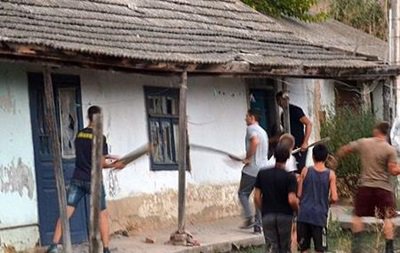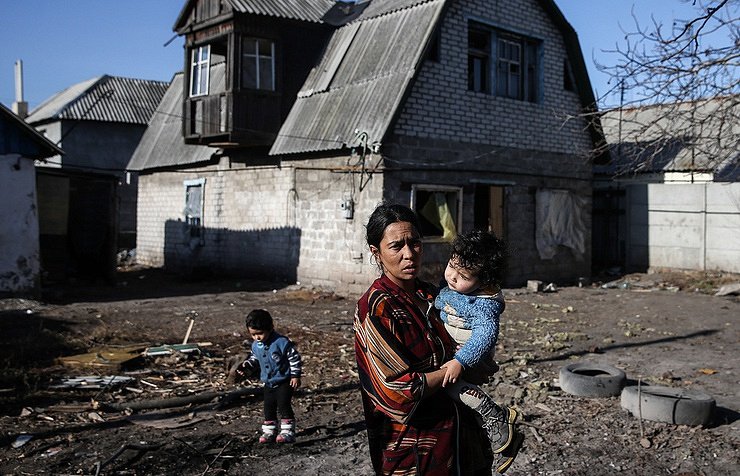Mob rules against Ukrainian Roma in 21st century pogrom
30 August 2016
“Mob law is the most forcible expression of an abnormal public opinion; it shows that society is rotten to the core.” – Timothy Thomas Fortune
Forced evictions are nothing new for Roma. For many, the ongoing process of settling and resettling when the state bullies and bulldozes Romani families out of their homes has become disturbingly familiar.
The ERRC is engaged in a continuous battle against these evictions, based on the illegality of forced evictions under national, European and human rights law. In most cases, the state will partially comply with legal standards but will, for example, fail to provide adequate alternative accommodation for those dispossessed. Yet the act of eviction, sometimes by force, is sanctioned and sustained by the state apparatus, which is concerning on the one hand, but also provides a measure of accountability or even normalcy. It is one thing for government authorities to evict poor Romani families from private or public land, it is an entirely different matter for the state to abet and even sanction the forcible removal of Roma by an angry mob of villagers.
This is exactly what happened on Saturday 27th August in in Loshchynivka, Odessa Oblast in Ukraine.
Following the tragic discovery of the body of a 9-year-old girl on Saturday morning, and the arrest of a 21-year-old Romani man on murder and rape charges: an angry mob descended on the homes of Roma living in the village. The residents of these homes were forced to flee, meaning there were thankfully no casualties resulting from the villagers’ turn at frontier justice.
In a video posted to YouTube, a section of the 300 strong mob set about destroying a Roma owned house, the lights still on, and the residents having fled for their lives. The work is eerily carried out in near silence apart from an occasional hooligan’s whoop of primal glee. Most disturbingly of all, are the images showing police officers accompanying the villagers to the Romani homes and standing silently whilst the pogrom continued.

Photo credit: kyivpost.com
The authorities’ response to the violent ousting of Romani residents in Loshchynivka shows a breakdown of the rule of law in rural Ukraine. The police officers’ complicity in the pogrom sends a dangerous message across the country that justice lies in the hands of the mob.
The next day, state officials including the village mayor Viktor Paskalov, and the Head of the Izmail District Administration Valentina Stoikova, met with over 200 villagers who demanded authorities remove the Roma living there. Before the meeting could be completed, a rumour went around the crowd that the Romani residents were returning, leading the baying mob to once again charge off in pursuit of them. Upon finding three terrified Romani women hiding in some bushes, police intervention was required to protect the women from the villagers.

Photo credit: bessarabiainform.com
The officials met with members of the Roma community who ‘agreed to voluntarily leave’ Loshchynivka, on the condition that their safety would be assured and transport provided on Monday morning for them to return and retrieve whatever remained of their possessions. After the villagers’ response to finding three Romani women the previous day, it is not surprising that few wanted to return to collect their belongings.
The decision to officially evict the Roma, taken by a Village Council at the behest of a violent, mobilised mob has no legal standing. After the events of the 27th August, it would be clear to Roma living in the village that their lives there could no longer continue and this likely influenced their decision to voluntarily leave. The role of the police force in the rioting which drove them out in the first place indicates that there would have been limited police protection for any Roma that remained in the village. The ERRC are looking into whether the withdrawal of police protection was made as a threat which coerced Roma to ‘voluntarily leave’ the village.
Furthermore, there has been no provision for alternative accommodation for many Roma from the village. According to our monitor, many complain they have nowhere to go and will remain in the Izmail District, on informal settlements in fields.

Photo credit: Mikhail pochuev
The initiating of a pogrom in modern Europe is deeply unsettling but not unprecedented. Striking similarities can be seen between the events in Loshchynivka and the Mlawa Pogrom of 1991 in Poland. In this case, Roma were driven from their homes after a hit-and-run incident involving an 18-year-old Romani man. Since the 1989 Romanian revolution, several pogroms predicated on the crime of an individual have taken place in villages across the Trans-Carpathian region of Romania and Ukraine. Also in 1999, the ERRC investigated numerous instances of ethnic Albanians using extreme violence to purge Kosovo of Roma in the wake of the withdrawal of Yugoslav forces.
In the case of Loshchynivka, the killing of a 9-year-old girl was not the sole motivator for the pogrom. Ethnic tensions and police negligence concerning incidents of illegal activities being carried out by elements of the Romani population had created a volatile situation which required only a spark to ignite the scenes of violence we saw on Saturday.
A criminal investigation into the riots of Saturday 27th August has been opened, but the act is hollow and devoid of meaningful judicial process considering the participation of the local council and police in the expulsion of Roma from the village. The authorities have already pandered to the wishes of the mob in expelling the Roma, the initiation of criminal proceedings is irrelevant as a precedent for mob law has already been set.
A submission to the Ombudsman regarding the official investigation has been submitted by Strategy 2020, a coalition of Ukrainian Roma NGOs. In a statement made by a representative of the Commissioner for Children’s’ Rights, Non-discrimination and Gender Equality, Aksana Pilipishina, the decision to evict the Roma is illegal. Pilipishina has also made a request to the Head of the Odessa Regional State Administration to take all possible measures in order to peaceably settle ethnic tensions in Loshchynivka in compliance with the principle of non-discrimination. An additional request was sent to the Chief of the National Police for Odessa region to ensure that police officers ensure public safety and order in the village.
The ERRC are investigating the matter further and will, if possible, be exploring any legal avenues which may be available.
“What we have here is a case where a Romani individual may, or may not have committed a crime. The investigation and if necessary, prosecution of this individual is the sole responsibility of the authorities who are invested with the power to carry out justice in society. Power to decide on someone’s guilt and punishment must never lie in the hands of a riotous, hysterical rabble. Authorities in Ukraine must act swiftly and decisively in prosecuting those involved to ensure rule of law returns to the region and the events in Loshchynivka do not act as incitement to further Roma pogroms in the country.” - Dorde Jovanovic, President of the European Roma Rights Centre.




